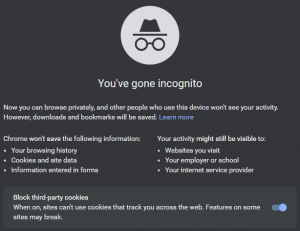Google faces a $5 billion class-action lawsuit over claims that it has been collecting people’s browsing information without their knowledge even when using the incognito browsing mode that’s meant to keep their online activities private.
The lawsuit, filed in the federal court in San Jose, California, alleges that Google compiles user data through Google Analytics, Google Ad Manager and other applications and website plug-ins, including smartphone apps, regardless of whether users click on Google-supported ads, according to a report in Reuters.
Google uses this data to learn about private browsing habits of Chrome users, ranging from seemingly innocuous data that can be used for ad-targeting—such as information about hobbies, interests and favorite foods—to the “most intimate and potentially embarrassing things” that people may search for online, according to the complaint.

Google “cannot continue to engage in the covert and unauthorized data collection from virtually every American with a computer or phone,” the complaint said, according to the report.
The technology problem at the root of the report is a feature called incognito mode in the Chrome browser, which ironically is one that is supposed to protect people when surfing the internet. Chrome users can turn on incognito mode to protect their browsing history, sessions and cookies from websites that want to use this information for marketing or ad-targeting purposes.
 However, the feature has long had a problem in that even when using their mode, people’s activity has still been detectable by websites “for years” due to a FileSystem API implementation, Google Chrome developer Paul Irish tweeted last year.
However, the feature has long had a problem in that even when using their mode, people’s activity has still been detectable by websites “for years” due to a FileSystem API implementation, Google Chrome developer Paul Irish tweeted last year.
Though Google said it implemented the FileSystem API in a different way in Chrome 76, released last year, the problem persists even in the latest version of Chrome 83, which was released last month, according to a report filed Thursday in ZDNet.
It is still possible to detect incognito mode in Chrome–as well as other Chromium-based browsers, such as Edge, Opera, Vivaldi, and Brave, which share the core of Chrome’s codebase, according to the report, which said Google still has not set a timeframe to fix the issue.
Developers even have taken the Chrome codebase scripts to expand the ability of websites to block incognito mode users from browsing, expanding it to other browsers that don’t use the same code base, including Firefox and Safari, the report said.
Ironically, the problem that’s put Google in legal hot water is nearly the same as the one the company accused browser rival Apple of having earlier this year in its Safari browser.
In January, Google researchers said they identified a number of security flaws in Safari’s private-browsing feature—called Intelligent Tracking Protection–that allow people’s browsing behavior to be tracked by third parties. Apple responded by saying it had already fixed the flaws in an update to Webkit technology in Safari.
Search-engine rival Duck Duck Go used news of the class-action suit as an opportunity to laud its own technology, which it offers as an alternative to Google search as a way to allow people to search and use the web privately.
Incognito mode isn't private. It never was.
DuckDuckGo is private. Will always be. https://t.co/bz5VmjurQW
— DuckDuckGo (@DuckDuckGo) June 3, 2020
“Incognito mode isn’t private. It never was.” the company said on Twitter. “DuckDuckGo is private. Will always be.”
Longtime Google critic, author, psychologist and researcher for the American Institute for Behavioral Research and Technology Dr. Robert Epstein also took to Twitter to reiterate his longstanding public opinion over Google’s privacy violations.
“#Google #Surveillance & Advertising just got sued for $5 BILLION for lying about its bogus ‘incognito’ mode on its Chrome browser,” he tweeted. “As I’ve always said, you’re STILL being tracked when you’re in that mode.”
The current case against the technology giant is Brown et al v Google LLC et al, U.S. District Court, Northern District of California, No. 20-03664. The New York-based law firm Boies Schiller & Flexner is representing the plaintiffs in the class-action suit, Chasom Brown, Maria Nguyen and William Byatt.










